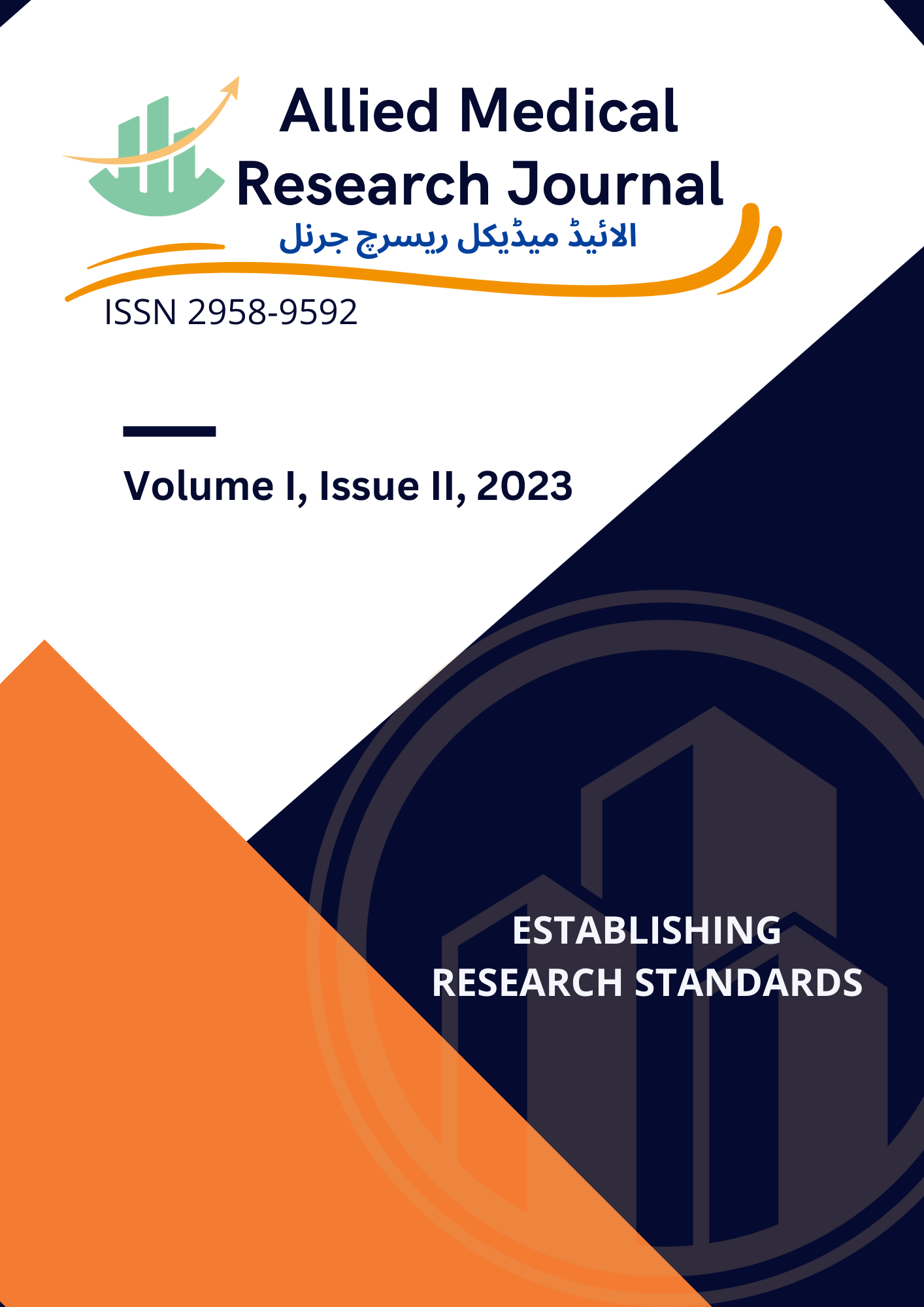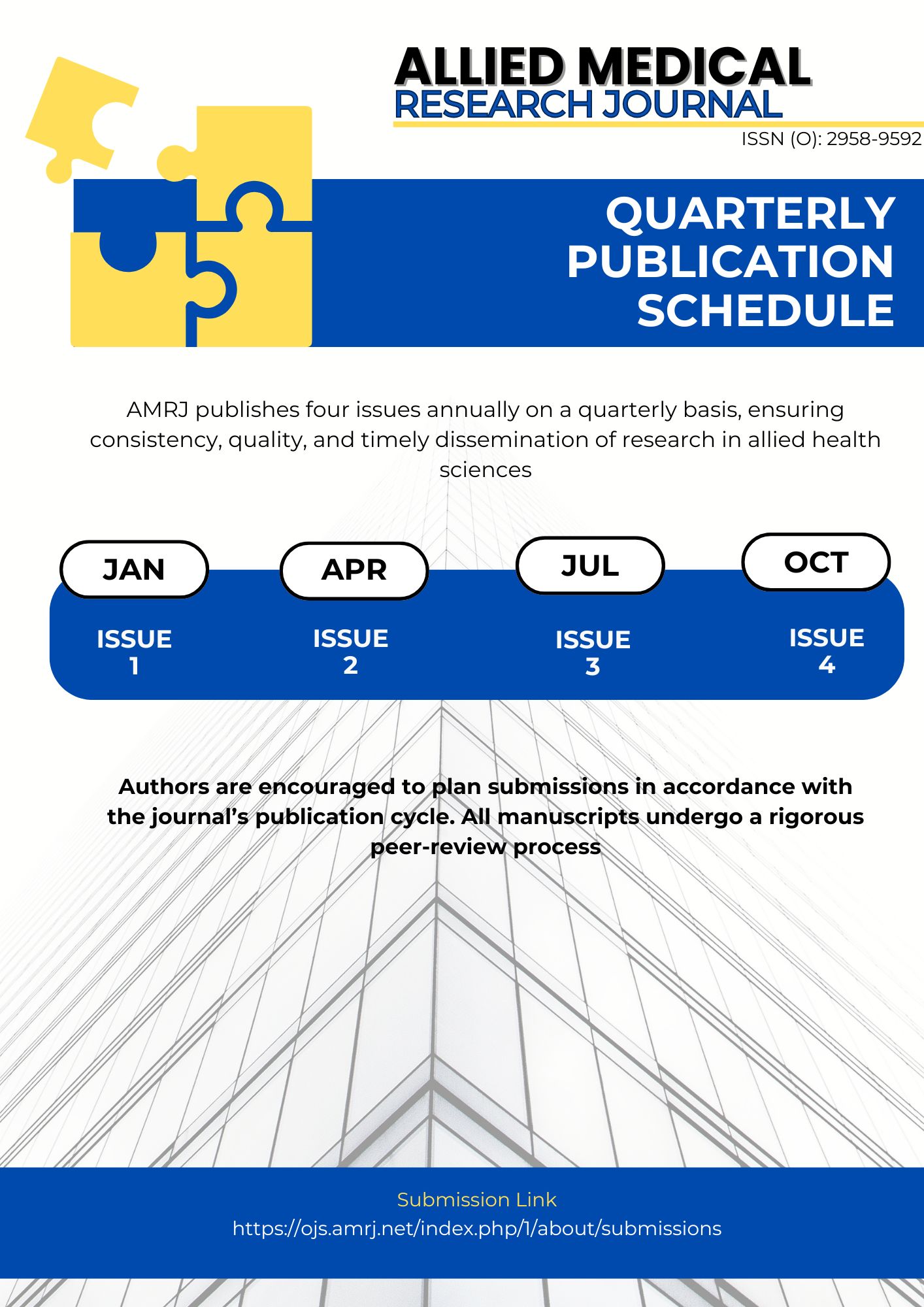Utilization, Knowledge, and Perception of the Ketogenic Diet among Medical University Students in the UK
Keywords:
Knowledge, Ketogenic Diet, Medical Students, Perception, Weight ManagementAbstract
Background
The ketogenic diet (KD) has gained popularity as a weight-management strategy and is being researched for its potential therapeutic benefits. Understanding the knowledge and perception of the KD among healthcare professionals, including medical students, is crucial for providing accurate patient information and guidance.
Methods
A survey-based study was conducted among public health program students in London to assess their knowledge and perception of the KD. Participants were asked questions about their demographic characteristics, dietary habits, sources of nutritional information, and understanding of the KD. Data were analyzed using descriptive statistics.
Results
Out of 76 participants, predominantly female (80.3%), the majority expressed satisfaction with their body weight (53.9%) and body shape (65.8%), while fewer participants were satisfied with their food habits (38.2%). Social media was the primary source of nutritional information (34.2%), and most participants had attended nutrition-related courses at university (71.1%). The participants showed limited knowledge of the KD, with a mean total score of 3.4±3.6 out of 11 points. Common misconceptions included the role of fruits in the KD (5.3% correct responses) and the long-term adverse effects of the diet. However, participants acknowledged the need for medical supervision and long-term clinical trials for KD users.
Conclusion
This study emphasizes the importance of enhancing knowledge and awareness of KD among public health program students. Medical students, as future healthcare providers, have a critical role in patient counseling and should possess accurate information about the KD to guide patients in making informed dietary decisions.
References
Watanabe M, Tozzi R, Risi R, Tuccinardi D, Mariani S, Basciani S, Spera G, Lubrano C, Gnessi L. Beneficial effects of the ketogenic diet on nonalcoholic fatty liver disease: A comprehensive review of the literature. Obesity Reviews. 2020;21(8):e13024. Roehl K, Sewak SL. Practice paper of the academy of nutrition and dietetics: classic and modified ketogenic diets for treatment of epilepsy. Journal of the Academy of Nutrition and Dietetics. 2017;117(8):1279-92.
Casanueva FF, Castellana M, Bellido D, Trimboli P, Castro AI, Sajoux I, Rodriguez-Carnero G, Gomez-Arbelaez D, Crujeiras AB, Martinez-Olmos MA. Ketogenic diets as treatment of obesity and type 2 diabetes mellitus. Reviews in Endocrine and Metabolic Disorders. 2020;21:381-97.
Sundfør TM, Svendsen M, Tonstad S. Effect of intermittent versus continuous energy restriction on weight loss, maintenance and cardiometabolic risk: a randomized 1-year trial. Nutrition, Metabolism and Cardiovascular Diseases. 2018;28(7):698-706.
Aaseth J, Ellefsen S, Alehagen U, Sundfør TM, Alexander J. Diets and drugs for weight loss and health in obesity–An update. Biomedicine & Pharmacotherapy. 2021;140:111789.
Deemer SE, Plaisance EP, Martins C. Impact of ketosis on appetite regulation—a review. Nutrition Research. 2020;77:1-1.
Calcaterra V, Verduci E, Pascuzzi MC, Magenes VC, Fiore G, Di Profio E, Tenuta E, Bosetti A, Todisco CF, D’Auria E, Zuccotti G. Metabolic derangement in pediatric patient with obesity: The role of ketogenic diet as therapeutic tool. Nutrients. 2021;13(8):2805.
Bräutigam Ewe M, Hildingh C, Månsson J, Lydell M. Primary care nurses’ perceptions and experiences of patients being overweight or obese as well as visions and attitudes about working with lifestyle issues: a qualitative interview study. BMC nursing. 2021;20:1-1.
Gandy J, editor. Manual of dietetic practice. John Wiley & Sons; 2019.
Arora N, Pulimamidi S, Yadav H, Jain S, Glover J, Dombrowski K, Hernandez B, Sarma AK, Aneja R. Intermittent fasting with ketogenic diet: A combination approach for management of chronic diseases. Clinical Nutrition ESPEN. 2023;54:166-74.
Rosas LG, Lv N, Xiao L, Lewis MA, Zavella P, Kramer MK, Luna V, Ma J. Evaluation of a culturally-adapted lifestyle intervention to treat elevated cardiometabolic risk of Latino adults in primary care (Vida Sana): a randomized controlled trial. Contemporary clinical trials. 2016;48:30-40.
Butt MU, Bawa MD, Ahmed H. Knowledge and perception about ketogenic diet among medical students. Biomedica. 2020;36(2):126-31.
Altamimi M, Badrasawi MM, Khalid B. Use, Knowledge and perception About Ketogenic Diet Amongst University Students from Medical and Health Sciences Faculties. Iraq Medical Journal. 2021;5(1).
Colombarolli MS, de Oliveira J, Cordás TA. Craving for carbs: food craving and disordered eating in low-carb dieters and its association with intermittent fasting. Eating and Weight Disorders-Studies on Anorexia, Bulimia and Obesity. 2022:1-9.
El-Kassas G, Ziade F. Exploration of the dietary and lifestyle behaviors and weight status and their self-perceptions among health sciences university students in North Lebanon. BioMed Research International. 2016;2016.
Masino SA, editor. Ketogenic diet and metabolic therapies: expanded roles in health and disease. Oxford University Press; 2022.
Mubarak R, Raza I, Khursheed A, Mushtaq M, Hanif B, Majeed AB. Therapeutic Effects of Ketogenic Diet in the Treatment of Epilepsy. Journal of Health and Medical Sciences. 2020;3(3).

Downloads
Published
Issue
Section
License
Copyright (c) 2023 Qurat ul Ain Hussain, Kiran Kaur, Ruheena Amreen

This work is licensed under a Creative Commons Attribution-NonCommercial 4.0 International License.








